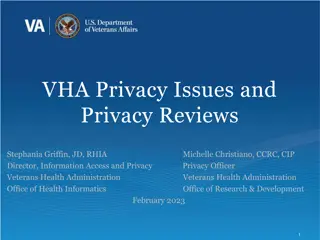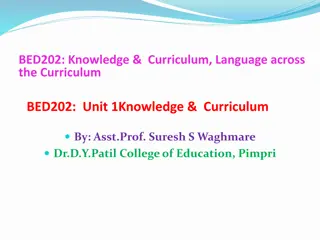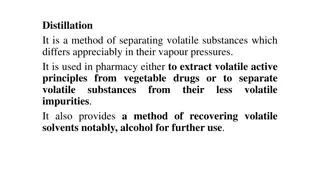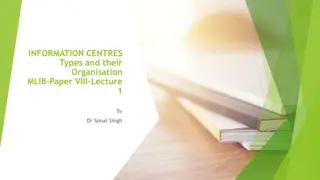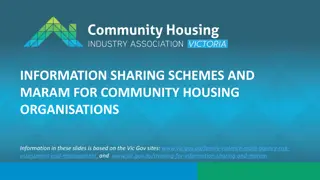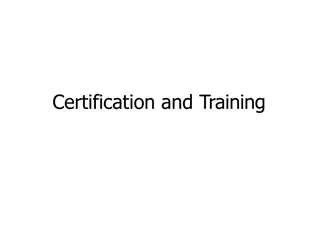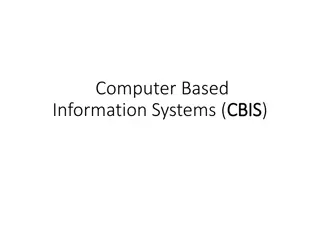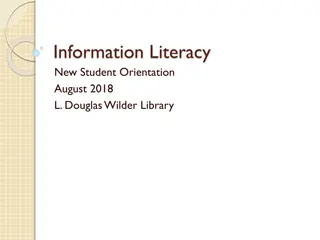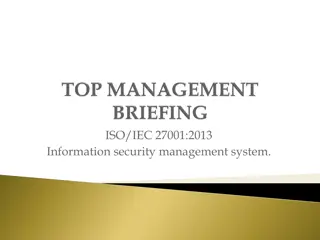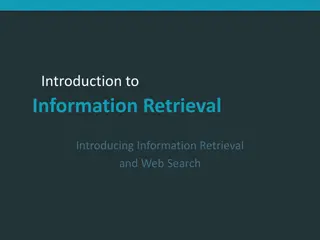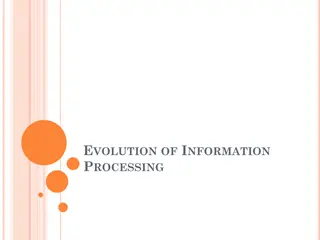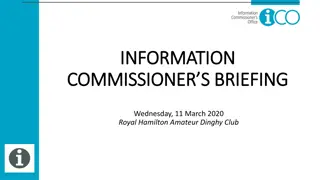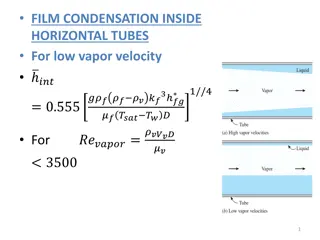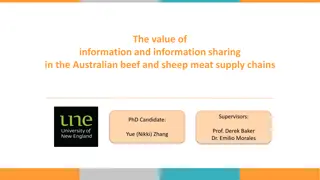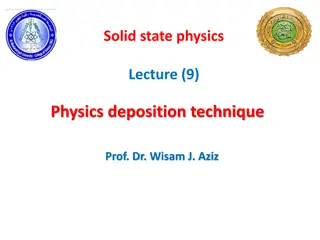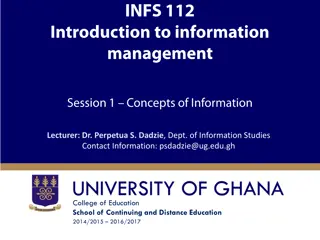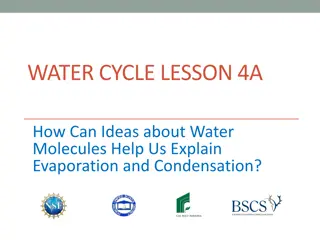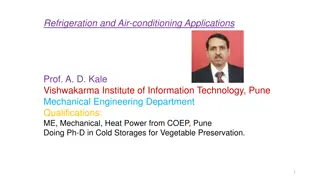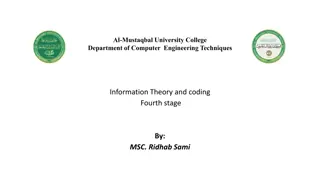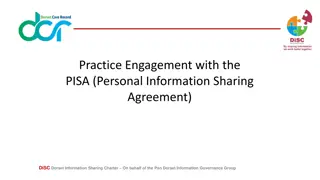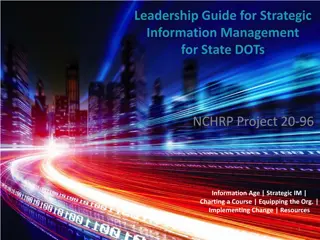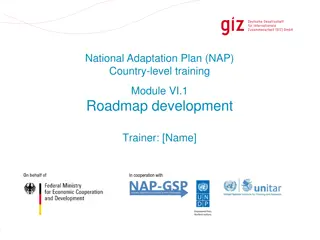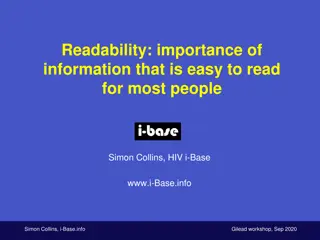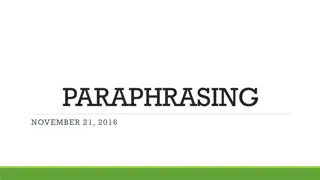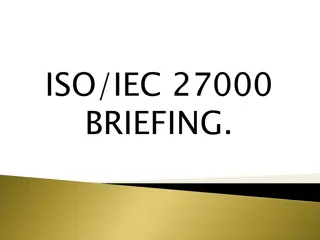Understanding Information Systems in Organizational Management
Management in organizations is divided into three levels: operational, tactical, and strategic. Each level requires different information systems to support various activities. Operational systems focus on routine transactions and control processes, while middle-level systems aid in semi-structured
9 views • 39 slides
Understanding Precipitation in Meteorology
Precipitation in meteorology is the result of atmospheric water vapor condensing and falling to Earth, a vital element of hydrology. It can occur in liquid or solid forms through processes like evaporation, cooling, condensation, and droplet growth. Different geographic and climate conditions impact
0 views • 17 slides
Understanding VA Privacy Issues and Sensitive Information
Explore the complex landscape of VA privacy issues, including data relationships, sensitive personal information (SPI), personally identifiable information (PII), individually identifiable information (III), and individually identifiable health information (IIHI). Learn about the roles and responsib
0 views • 29 slides
Understanding Data, Information, Knowledge, and Curriculum in Education
Data is raw facts and figures, information is interpreted data with meaning, and knowledge is the accumulation of facts and information. The nature of knowledge involves acquiring information from real-life experiences and education. This content delves into the distinctions between data, informatio
0 views • 64 slides
Distillation: A Method for Separating Volatile Substances
Distillation is a method used in pharmacy to extract active principles, separate substances, and recover solvents. Simple distillation involves vaporizing a liquid, condensing the vapors, and collecting the liquid. It is commonly used for separating liquids from non-volatile solids under atmospheric
1 views • 69 slides
Understanding Information Centres: Types and Organization
Modern libraries are evolving into information centres, offering precise information to users. They bridge the gap between user needs and available information. Information centres play a crucial role in providing timely and relevant information, aiding in decision-making and preventing duplication
0 views • 28 slides
Information Sharing Schemes and MARAM for Community Housing Organizations
These slides provide insights on information sharing schemes and the MARAM framework designed for community housing organizations to promote the wellbeing and safety of children, assess family violence risks, and enhance collaboration across service sectors. The Child Information Sharing Scheme (CIS
2 views • 15 slides
Inter-Cluster Coordination and Information Management in Humanitarian Emergencies
Inter-Cluster Coordination and Information Management play vital roles in humanitarian emergencies. The coordination mechanism involves regular meetings convened by the RC/HC and coordinated by OCHA, providing opportunities for clusters to collaborate on shared planning, needs assessments, and poole
3 views • 13 slides
Certification and Training in Information Security
This content covers various aspects of certification and training in the field of information security, including organizational information security outlines, positions in information security personnel, and professional certifications from renowned organizations. It also provides insights into dif
0 views • 18 slides
Mastering Note-Making Skills for Effective Learning
Note-making is a crucial skill for condensing large volumes of information into concise, organized summaries. It aids in remembering key details, preparing for exams, planning presentations, and engaging in discussions. This practice requires selecting and extracting relevant data, using abbreviatio
1 views • 20 slides
Understanding Computer-Based Information Systems (CBIS)
Computer-Based Information Systems (CBIS) transform raw data into valuable information to support decision-making, coordination, and control. CBIS utilize computers to collect, process, analyze, and distribute information efficiently. Data is the raw material, while information is the processed data
0 views • 27 slides
Understanding Information Literacy: A Comprehensive Guide for Students
Information literacy is crucial for academic success. It involves the ability to recognize the need for information, locate relevant sources, evaluate their credibility, and effectively use the information for research and presentations. Primary and secondary sources play a vital role in gathering i
0 views • 19 slides
Understanding ISO/IEC 27001:2013 Information Security Management System
Overview of ISO/IEC 27001:2013 standard for information security management system (ISMS). Learn about the importance of protecting information assets, preserving confidentiality, integrity, and availability of information, and steps to certification. Enhance understanding of different types of info
0 views • 35 slides
Introduction to Information Retrieval and Web Search
Information Retrieval (IR) involves finding unstructured material, typically text documents, within large collections stored on computers to satisfy information needs. This process extends beyond web search to include email search, corporate knowledge bases, and legal information retrieval. The text
0 views • 53 slides
Evolution of Information Processing in Computerization
Evolution of information processing from raw data to useful information through computerization. Data is collected, processed, and converted into valuable insights for decision-making. The growth of complexity led to the development of Information Technology, enabling efficient creation, processing,
0 views • 7 slides
Information Commissioner's Role in Bermuda's Public Access to Information
The Information Commissioner in Bermuda plays a crucial role in promoting public access to information, ensuring compliance with the PATI Act, and safeguarding the right to access public information. This independent office provides guidance to public authorities, oversees enforcement activities, an
0 views • 37 slides
Heat Transfer in Condensation Processes: Film and Dropwise Mechanisms
Film condensation inside horizontal tubes for low vapor velocity is explored, highlighting the importance of the condensation number and heat transfer coefficients. Dropwise condensation, characterized by droplets on the surface, is also discussed for its effectiveness in heat transfer. The condensa
1 views • 16 slides
Ideal Reheat Rankine Cycle Analysis for Steam Power Plant
Analyzing the thermal efficiency and mass flow rate of an ideal Rankine cycle with superheat and reheat using steam as the working fluid. The cycle involves stages of expansion, reheating, and condensing to generate a net power output of 100 MW. Detailed calculations for states of the cycle are prov
1 views • 5 slides
Alternative Options for Small Commercial Cabinets in High Ambient Areas
Explore alternative options for plug-in small commercial cabinets in high ambient areas in the Southern African region. Self-contained refrigerated cabinets with integral condensing units and environmentally friendly refrigerants are discussed, along with challenges faced by independent companies an
0 views • 5 slides
Enhancing Information Sharing in Australian Meat Supply Chains
This research delves into the value of information and information sharing within the beef and sheep meat supply chains in Australia. It explores the benefits of improved decision-making, reduced costs, and enhanced supply chain performance through strategic information sharing. The study also ident
1 views • 21 slides
Understanding Distillation: Boiling Points and Factors
Distillation is a process of vaporizing and condensing liquids to separate components based on boiling points. This method utilizes differences in boiling points of liquid mixtures to achieve separation. Factors influencing boiling points include molecular weight, functional groups, and intermolecul
0 views • 16 slides
Effective Revision Techniques for Improved Learning
Engage in active revision techniques to enhance learning efficiency. Strategies include organizing notes, condensing information, and utilizing visual aids like post-it notes. By following these methods, you can improve recall and retention, ultimately boosting your academic performance.
0 views • 23 slides
Overview of Physical Vapor Deposition (PVD) Techniques in Thin Film Deposition
Physical Vapor Deposition (PVD) includes various vacuum techniques for depositing thin films on substrates through physical means. This method involves a dry vacuum process to coat objects with different materials. PVD processes utilize methods like Mechanical, Evaporation, Sputtering, Ion plating,
0 views • 31 slides
Design Considerations for High Ambient Temperature Operations
Designing for high ambient conditions requires special attention to condensing temperatures, refrigerant types, safety standards, and component availability. Careful selection of heat exchangers, compressors, and system applications is crucial to ensure energy efficiency and safety in various coolin
0 views • 8 slides
Avoco's Cloud-Based Information Card Selector: Enhancing Usability and Security
Avoco's Cloud-Based Information Card Selector is a leap forward in Information Card usability, offering benefits such as universal access to Information Cards, zero footprint for end users, and enhanced security features. The platform allows for easy creation, import, and backup of cards, as well as
0 views • 29 slides
Understanding Data, Information, and Knowledge in Information Studies
Data, information, and knowledge play vital roles in our lives and are essential in information studies. Dr. Perpetua Dadzie explores the definitions and distinctions among data, information, and knowledge, emphasizing the transformation process that turns raw data into meaningful information. The s
0 views • 23 slides
Crack the Code: A Journey into Transposition Ciphers
Mathematicians play a crucial role in industries like telecommunications and internet companies by condensing data and ensuring error detection. Transposition ciphers, like the Scytale used by Romans, offer a challenging way to encrypt messages. Test your skills with code-breaking challenges and exp
0 views • 4 slides
Understanding Evaporation and Condensation Through Water Molecules
Exploring the water cycle and states of matter, this lesson delves into how ideas about water molecules aid in explaining evaporation and condensation. Through diagrams, simulations, and real-life scenarios, students learn about the movement and changes of water molecules. By comparing their ideas w
0 views • 12 slides
Applications of Refrigeration in Industrial and Chemical Industries
Refrigeration plays a vital role in various industrial and chemical applications, including food processing, preservation of perishable goods, air conditioning, and separation of gases in petrochemical plants. It helps maintain optimum temperatures for different processes, from freezing food product
0 views • 14 slides
Understanding the Role of Classified Information in Criminal Trials
In criminal trials, the handling of classified information is crucial and governed by specific rules. Defendants do not have an inherent right to access classified information, and there are procedures in place to determine its use in court. The rights surrounding secret evidence include protection
0 views • 43 slides
Understanding Information Entropy in Information Theory
Information entropy, a key concept in information theory, measures the average amount of information in a message. Source entropy and binary source entropy are explained with examples, along with maximum source entropy for both binary and non-binary sources. Learn how to calculate entropy for differ
0 views • 12 slides
Enhancing Information Sharing: DISC and PISA Benefits
DISC (Dorset Information Sharing Charter) and PISA (Personal Information Sharing Agreement) facilitate improved information sharing among healthcare organizations in Dorset. DISC establishes robust principles for managing data flow and promoting best practices in information governance, while PISA t
0 views • 8 slides
Guide to Writing Effective Summaries
Craft concise summaries for content by condensing key information. Enhance writing skills by practicing summarization techniques. Learn how to avoid common pitfalls and create impactful summaries beneficial for various purposes, such as academics, research, or presentations.
0 views • 5 slides
Leadership Guide for Strategic Information Management in State DOTs
This guide provides insights into maximizing the value of available information, enhancing efficiency in information collection and use, and improving organizational readiness. It addresses the evolving role of transportation agencies as facilitators of information and the significance of informatio
0 views • 27 slides
National Adaptation Plan (NAP) Coordination and Roadmap Development
This training module focuses on developing a roadmap for the National Adaptation Plan (NAP) process. Participants will learn about coordination structures, examples from different countries, and key elements of roadmaps. The session aims to guide participants in condensing key findings into a consis
0 views • 18 slides
Importance of Readable Patient Information in Healthcare
Patient information plays a crucial role in healthcare, but the readability of this information is often overlooked. Simon Collins discusses how difficult text can create barriers to accessing healthcare and the importance of making patient information easy to understand. The talk emphasizes the nee
0 views • 37 slides
Mastering Textual Evidence: Paraphrasing Techniques and Strategies
Learn the art of paraphrasing through techniques such as replacing subjects and words, rearranging sentences, and condensing information. Understand the difference between quoting, summarizing, and paraphrasing, illustrated with examples and tips on effective paraphrasing. Remember the R.A.P. approa
0 views • 8 slides
Selling Information to Budget-Constrained Buyers
The images and descriptions discuss the concept of selling information through consulting, focusing on marketing, consumer information, and credit reports. Motivations for targeting budget-constrained buyers and the optimal mechanisms for selling information are explored. The content highlights mode
0 views • 26 slides
Importance of Information Protection and Security Measures
Enhance understanding of information and information security, different types of information assets, classification of internal and confidential information, types of data, information life cycle, and potential risks if information is not well-protected.
0 views • 25 slides
Efficient Assistance for Writing Summaries
Crafting effective summaries involves condensing information while maintaining clarity. This task can be achieved by focusing on key points, using concise language, and ensuring coherence. By following these strategies, one can create summaries that are informative and engaging.
0 views • 9 slides


